- Home
- 2023
Charitha warns of impending constitutional crisis
- Accuses President of treating Constitutional Council as an agency under his authority
- Emphasises necessity for an extensive discussion on issue within Sri Lankan society
- Says action of Govt. could lead to a crisis in governance and it must be stopped
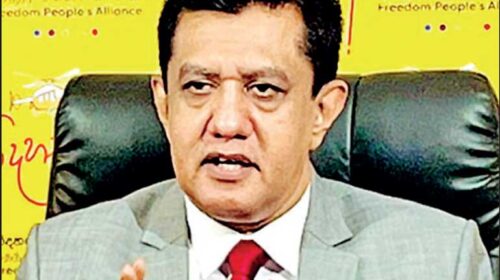 Freedom People’s Congress (FPC) member and parliamentarian Prof. Charitha Herath issued a warning yesterday, expressing concern about an impending constitutional crisis in the country.
Freedom People’s Congress (FPC) member and parliamentarian Prof. Charitha Herath issued a warning yesterday, expressing concern about an impending constitutional crisis in the country.
The MP said that in each constitutional amendment since the 17th amendment to the constitution, there has been deliberation on limiting the powers of the Executive, ultimately leading to the establishment of the Constitutional Council under the 21st Amendment to the Constitution.
Commenting on the necessary composition of the Constitutional Council, Herath pointed out that, at present, members from opposition parties, excluding the primary opposition party, have yet to be appointed to the council.
He observed that although President Ranil Wickremesinghe has put forward the President of the Court of Appeal for a vacant position in the Supreme Court, there is a divided opinion within the Constitutional Council.
“Consequently, the President addressed the issue in a recent parliamentary statement, expressing a perception that the Constitutional Council was established to assist the Executive in its functions,” he remarked.
Highlighting opposition from others, Herath emphasised the necessity for an extensive discussion on this issue within Sri Lankan society.
“He not only conveyed these sentiments but also suggested the formation of a parliamentary select committee to investigate the actions of the Constitutional Council. Additionally, a media report has disclosed that the President has suspended the printing of a gazette pertaining to a 40-page manual outlining the procedures of the Constitutional Council. The potential appointment of a select committee further reinforces my belief that there are indications of an imminent constitutional crisis,” he said.
Herath noted that the Constitutional Council was proposed by the United National Party led by Wickremesinghe and the common belief is that the Council was set up by UNP-led Governments to give some power back to the Parliament from the Executive.
“However the President has deviated from this and is acting in a manner treating the Council as an agency under his authority. This could result in a crisis in governance. This must be stopped,” the MP said.
https://www.ft.lk/news/Charitha-warns-of-impending-constitutional-crisis/56-755977
Sri Lanka ready to join BRI phase two, China FTA to be expedited
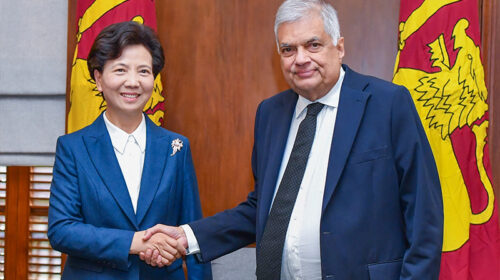 ECONOMYNEXT – Sri Lanka is among countries ready to join the second phase of China’s Belt & Road Initiative (BRI), with a free trade agreement (FTA) between the two countries to be also expedited, according to a discussion between President Ranil Wickremesinghe and a top Chinese official.
ECONOMYNEXT – Sri Lanka is among countries ready to join the second phase of China’s Belt & Road Initiative (BRI), with a free trade agreement (FTA) between the two countries to be also expedited, according to a discussion between President Ranil Wickremesinghe and a top Chinese official.
Wickremesinghe told visiting special envoy of the Chinese President, state councillor Shen Yiqin, that the BRI is expected to make a more substantial economic contribution, according to a statement from the president’s office said Monday November 20 afternoon.
China is also prioritising the extension of a China-Myanmar Economic Corridor to the island nation, according to Yiqin.
This was during a courtesy call paid by President Xi Jinping’s envoy to President Wickremesinghe Monday morning in Colombo. Both parties also agreed to expedite the implementation of the China-Sri Lanka Free Trade Agreement, the statement said.
The primary focus of the meeting was to enhance tourism and trade relations between the two countries, according to the statement.
“The President expressed gratitude for China’s support to Sri Lanka, notably acknowledging their assistance in the country’s debt restructuring programme. He extended sincere thanks to the Chinese President and the government for their invaluable support in this regard,” the statement said.
Wickremesinghe also expressed Sri Lanka’s desire to augment cooperation between the two countries in the fields of tourism, sports and agriculture . Both the Hambantota Port and Colombo Port City are currently prepared for investment opportunities, he said.
“The President also noted that countries such as Sri Lanka, participants in the Belt & Road initiative, are prepared to embark on the second phase of the initiative, which is expected to make a more substantial economic contribution.
“The President outlined the measures taken by Sri Lanka to access the Regional Comprehensive Economic Partnership (RCEP), and further affirmed Sri Lanka’s commitment to preserving the Indian Ocean as a free zone for navigation and ensuring it remains a peaceful region, free from global geopolitical rivalries.”
The visiting Chinese official has said her government is prioritising the extension of the China-Myanmar Economic Corridor to Sri Lanka.
Yikn reaffirmed China’s enduring support to Sri Lanka and emphasised her commitment to strengthening the relations between the two countries, the president’s office said. (Colombo/Nov20/2023)
Sri Lanka ready to join BRI phase two, China FTA to be expedited
Harsha exposes flaws in 2024 Budget in hard hitting critique
- Alleges blatant violation of the Fiscal Management Responsibility Act in Budget 2024, with Budget deficit exceeding 5%
- Says staggering increase in poverty affecting 3 to 7 million people, highlighting a critical issue overlooked in Budget
- Critiques Govt.’s “Oxymoron” economic approach and absence of a comprehensive plan for making Sri Lanka an advanced economy by 2048
- Says tax burden is excessively high, risking a decline in consumption, business failures, and an exodus of professionals
- Reveals 18% VAT items list; calls it unfair; alleges COL allowance hike an eyewash
- Expresses gratitude to petitioners who played pivotal role in recent Supreme Court verdict on economic crimes
- Calls for a parliamentary discussion on civic rights of those found guilty of bankrupting Sri Lanka
- Proposes robust measures to combat corruption, including the implementation of STAR program
- Emphasises reservations regarding Macro-linked Bond (MLB) proposal, says it raises questions about potential benefits favouring external investors over provident fund workers during debt restructuring
- Argues a 30% haircut is inadequate for ensuring debt sustainability, underscoring need for a more comprehensive and equitable approach
- Says urgency for transparency, accountability, and a visionary approach for a new economic trajectory
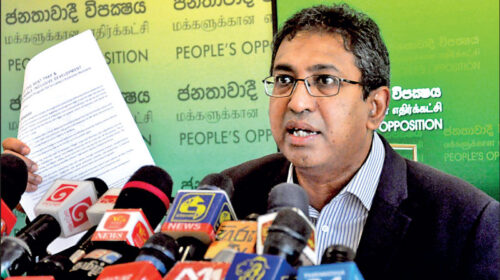 Ina compelling address toParliament, main Opposition Samagi Jana Balawegaya (SJB) MP Dr. Harsha de Silva delivered a comprehensive critique of Budget 2024, shedding light on critical issues that demand urgent attention.
Ina compelling address toParliament, main Opposition Samagi Jana Balawegaya (SJB) MP Dr. Harsha de Silva delivered a comprehensive critique of Budget 2024, shedding light on critical issues that demand urgent attention.
De Silva, who is also the Committee on Public Finance (COPF) Chairman, meticulously outlined the shortcomings and concerns surrounding the economic policies proposed in the budget, providing a stark contrast to the optimistic claims made by the Government.
Dr. de Silva commenced by pointing out a blatant violation of the Fiscal Management Responsibility Act (FMRA) within Budget 2024, citing an alarming budget deficit exceeding 5%.
He substantiated his concerns by referencing reports from LirneAsia, the World Bank, and UNDP, revealing a staggering increase in poverty affecting 3 to 7 million people. The multi-dimensional vulnerabilities highlighted by UNDP underscored the severity of the crisis, with over 50% of those affected categorised as multidimensionally poor.
De Silva expressed gratitude to petitioners who played a pivotal role in the recent Supreme Court verdict on economic crimes. He emphasised that the court›s rigorous discussion identified key figures, including Mahinda Rajapaksa, Gotabaya Rajapaksa, Basil Rajapaksa, Ajith Nivard Cabraal, and Dr. P.B. Jayasundara et al, as responsible for the economic downturn, pushing over 4 million people into poverty. He called for a parliamentary discussion on the civic rights of those found guilty of bankrupting Sri Lanka.
Contrary to the President›s claims of stabilised inflation and economic equilibrium, de Silva cited CBSL former Deputy Governor W.A. Wijewardene›s statistics. The cost of living for a family of four, he revealed, had surged from Rs. 91,880 in January 2021 to Rs. 175,490, illustrating a 91% increase in the last two years.
Labelling the current Government as an «Oxymoron,» SJB MP drew a parallel to Shakespeare›s Romeo & Juliet. In this case, ‘being together is such a sweet sorrow’. He raised questions about the legitimacy of the Government›s economic vision. MP Harsha presented a scientific analysis of the growth targets set by the Government. To achieve advanced economic status by 2048, he highlighted the necessity of a growth rate of 6.4% from 2027 to 2048. He challenged alternative claims, stating that even growing at 3% would delay reaching advanced economy status until 2068.
De Silva dissected Budget 2024, emphasising three critical pillars for Sri Lanka›s recovery: eradicating corruption, creating economic opportunities, and ensuring social equity. The seasoned politician delved into each point, offering a pragmatic assessment and proposing viable alternatives.
Need to combat corruption
He underscored the need for robust measures to combat corruption across various sectors. He criticised the absence of tangible anti-corruption initiatives, citing examples like the cricket scandal, sugar tax scam, and fraudulent activities in the liquor industry. The SJB parliamentarian questioned the Government’s inaction and proposed the implementation of the Stolen Assets Recovery (STAR) program and the establishment of an independent prosecutor’s office, as outlined in the SJB blueprint.
Moving to the second point, de Silva highlighted the importance of creating economic opportunities for youth in rural areas, empowering entrepreneurs, supporting small and medium businesses, and ensuring fair prices for farmers. He argued that eradicating corruption alone is insufficient and advocated for a broader economic vision.
In his exploration of the third key aspect, the SJB MP shed light on the complexities of fiscal consolidation and expenditure reduction, emphasising the profound implications for social equity. Despite the President’s focal point on revenue-based fiscal consolidation, concerns surfaced regarding the comparatively meagre attention given to reducing overall expenditure.
He acknowledged challenges in curtailing expenditure, particularly in vital sectors like Health and Education, allocated a modest 1.7% of GDP. However, he expressed reservations about funding directed to loss-making SOEs, exemplified by SriLankan Airlines, which sought Rs. 110 billion to settle liabilities to Ceylon Petroleum Corporation (CPC) recently. This raises concerns about fairness in comparison to the total expected revenue from PAYE of Rs. 100 billion annually or essential needs like children’s uniforms, a significant 27 times less.
Criticism was directed toward the extension of tax breaks, citing the Strategic Development Projects (SDP) Act and recent Supreme Court rulings on preferential tax treatment for associates, resulting in substantial losses to the Treasury.
He said a historical lens revealed a stark decline in Government revenue from 20-21% of GDP in 1994 to a current low of 8%, framing a narrative of economic transformation. The disparity between IMF revenue targets (15% of GDP by 2026) and the anticipated 10.2% for 2023 was underscored, calling for a substantial 2.5% increase, equivalent to Rs. 1229 billion.
Fairness and transparency for tax changes
However, concerns were articulated regarding proposed tax changes, especially their disproportionate impact on citizens through heightened consumption taxes. For example, the VAT hike from 15 to 18% and the removal of VAT exemptions for items like petrol, diesel, gas, and fertiliser could drive inflation up and consumption down. He called for fairness and transparency advocating for the disclosure of tax changes to Parliament, ensuring public awareness amid talks of Government giveaways.
De Silva proposed the Government implement his revised PAYE tax structure, significantly reducing the burden on professionals while still achieving the expected income. The MP lamented the lack of response from the Ministry of Finance to their proposal, contrasting it with the President’s call for cooperation.
Rallying cry for comprehensive reforms
In a dramatic climax, de Silva concluded that the proposed tax burden is excessively high, risking a decline in consumption, business failures, and an exodus of professionals from Sri Lanka.
His impassioned critique serves as a rallying cry for comprehensive reforms, emphasising the urgency of addressing corruption, fostering economic growth, and ensuring social justice to pave the way for Sri Lanka’s resurgence.
Acknowledging the Government’s efforts to broaden the tax net, de Silva highlighted initiatives such as the requirement for a Tax Identification Number (TIN) to open a bank account, obtain building permits, register vehicles, or renew revenue licence.
These measures, while commendable, de Silva said set the stage for a broader conversation about Sri Lanka’s economic trajectory, moving beyond stability to growth.
He stressed the imperative of transcending mere economic stability and transitioning towards sustainable growth. He referenced the International Monetary Fund’s (IMF) expectation for Sri Lanka to achieve debt sustainability by 2027, emphasising the challenges posed by a projected debt-to-GDP ratio of 104%, significantly exceeding the internationally accepted norm of 60%.
Expressing concern over the staggering debt-to-GDP ratio, de Silva underscored the potential ramifications, particularly the substantial interest payments. With interest payments for 2024 reaching a staggering Rs. 2,651 billion against revenue of Rs. 4,127 billion, he pointed out that Sri Lanka could become the world’s top contributor to interest payments relative to Government revenue.
Raising pertinent questions, the SJB MP inquired about the status of discussions with the Exim Bank of China and the agreement of the Paris Club, questioning the transparency of the process. He delved into the controversial Macro-linked Bond (MLB) proposal, expressing reservations about its potential benefits favouring external investors over the workers in provident funds who bore the majority of the burden during debt restructuring.
He passionately urged authorities not to bind future administrations to what he perceived as an unjust deal with International Sovereign Bond (ISB) holders. Furthermore, he reiterated that a 30% haircut is insufficient for debt sustainability. He questioned the beneficiaries of specific bonds, including the $500 million bond, and sought clarity on the ownership of Hamilton Reserve bonds amounting to $250 million. The recent Supreme Court decision added further complexity, prompting Harsha to call for transparency in navigating the fiscal challenges.
Expressing concerns about the stability of the banking system, de Silva questioned the lack of information on the promised asset quality review by the President. He delved into the Budget’s allocation of Rs. 450 billion for bank recapitalisation in 2025, emphasising the President’s acknowledgment that this amount may be insufficient.
The proposed 20% privatisation of the Bank of Ceylon (BOC) and People’s Bank was commended as a move towards stability and accountability, free from political influence.
De Silva painted a challenging picture for Sri Lanka’s future debt issuance, projecting a debt of $ 68 billion by 2027. He raised critical questions about sourcing the required funds through taxes and the conversion of tax revenue into dollars. Addressing this, he emphasised the necessity of increasing forex reserves and advocated for a growth-oriented production economy.
Need for mindset shift to achieve higher growth rates
In a sharp critique of the current Government’s approach, the SJB MP highlighted the need for a mindset shift to achieve higher growth rates. He underlined the importance of breaking down barriers and reducing red tape to connect with global production networks. Referencing opposition to the Sri Lanka/Singapore Free Trade Agreement (FTA) by certain political entities, he advocated for an open-minded approach to foster economic growth.
Drawing inspiration from former President J.R. Jayewardene’s initiatives in the 1970s, de Silva emphasised the role of investments in building capital, especially in a country with low savings. He urged the creation of an environment conducive to entrepreneurs, promoting foreign direct investments as a means to fuel economic growth.
He proposed creative solutions such as building wind farms in Mannar and connecting Sri Lanka to India’s grid to earn valuable forex by exporting power to South India. He challenged conventional thinking, advocating for an open mindset in generating forex through innovative and collaborative projects.
De Silva ‘s comprehensive address underscores the intricate challenges facing Sri Lanka’s economic landscape and proposes strategic reforms to navigate the country towards equitable growth. His impassioned plea for transparency, accountability, and a visionary approach serves as a rallying cry for a new economic trajectory.
Ex-Tourism Chief recommends preserving historic Nuwara Eliya Post Office
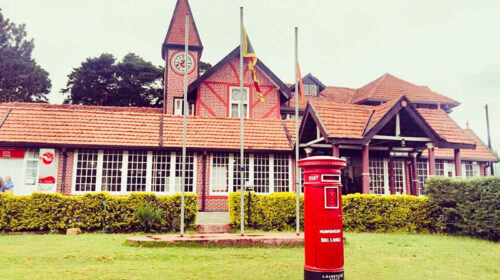 Former Sri Lanka Tourism Chairperson Kimarli Fernando suggested yesterday to consider switching the President’s Nuwara Eliya residence into a hotel as an option if demand arises for additional accommodation.
Former Sri Lanka Tourism Chairperson Kimarli Fernando suggested yesterday to consider switching the President’s Nuwara Eliya residence into a hotel as an option if demand arises for additional accommodation.
She voiced her concerns over the Government’s decision to convert the historic Nuwara Eliya Post Office into a hotel, acknowledging the ‘excess’ room capacity in upcountry city.
“Nuwara Eliya currently has excess room capacity. Should there be a need for more rooms, converting the President’s Nuwara Eliya house, to a hotel, could be considered in the future, if needed,” she said via her Facebook account.
On Monday the Cabinet of Ministers approved a proposal presented by President Ranil Wickremesinghe in his capacity as the Investment Promotion Minister to convert Nuwara Eliya Post Office into a hotel.
“Taj Group has proposed converting the Nuwara Eliya Colonial-era Post Office into a hotel. The proposal came to the Presidential Secretariat and the specifics will be made available by the Secretariat once the project gets off the ground,” Cabinet Co-Spokesman and Minister Bandula Gunawardana confirmed at the post-Cabinet meeting media briefing on Tuesday.
Fernando said the Post Office in Nuwara Eliya, the Tudor-style two-storey red-brick building with a clock spire, was constructed in 1894 by the British. Sri Lanka Post has been in existence for more than 209 years, with a proud history and heritage.
“It should remain as a working Post Office. If management needs to be shared to uplift, where income is shared, a unique memorabilia museum, store or tea boutique could be considered, to generate income,” she noted.
Sri Lanka’s democracy under siege
lurking shadows of business-politics nexus
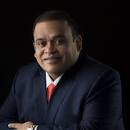
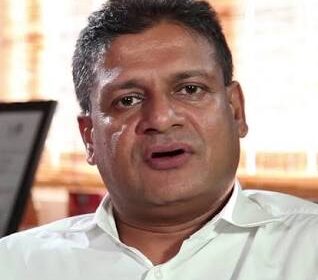 In a startling revelation, Sri Lanka’s businessman Dhammika Perera, who aspires to enter the presidential race, has made a striking statement that should raise alarm bells. According to a recent article by K. Sujeewa in “Anidda” newspaper, published on Sunday, October 29, Perera is willing to pay a significant price for votes, boldly stating, “If SLPP vote base ‘Pohottuwa’ rises to 30%, the remaining 20% will be bought over in cash.” This admission sheds light on a disturbing trend in the country’s politics and the potentially dangerous implications for democracy.
In a startling revelation, Sri Lanka’s businessman Dhammika Perera, who aspires to enter the presidential race, has made a striking statement that should raise alarm bells. According to a recent article by K. Sujeewa in “Anidda” newspaper, published on Sunday, October 29, Perera is willing to pay a significant price for votes, boldly stating, “If SLPP vote base ‘Pohottuwa’ rises to 30%, the remaining 20% will be bought over in cash.” This admission sheds light on a disturbing trend in the country’s politics and the potentially dangerous implications for democracy.
Business Tycoons Eyeing the Presidential Arena
Dhammika Perera is not alone in his quest for political power. Another prominent businessman, Dilith Jayaweera, is reportedly gearing up to join the presidential race. However, their affiliations and motives must be scrutinized. Both Perera and Jayaweera are widely seen as loyalists of the Rajapaksa clan, indicating an ongoing attempt by the Rajapaksas to consolidate their power base through unconventional means.
These business tycoons have amassed significant wealth, particularly since the Rajapaksas’ rise to power in 2005. As confirmed by the Auditor General, out of the 8 trillion project loans Sri Lanka received by 2015, only 2 trillion worth of assets can be accounted for. This alarming gap begs the question: what happened to the remaining 6 trillion, and how might it be connected to business figures? Entry of Perera and Jayaweera
Dhammika Perera found his way into Sri Lanka’s Parliament, albeit through unconventional means, using a legislative loophole. Dhammika Perera and Dilith Jayaweera’s role in previous elections and their financial investments in political campaigns cannot be ignored. The question arises: how much did these businessmen contribute to bringing political leaders like Gotabaya Rajapaksa to power?
Business Interests and Political Favours
The Rajapaksas have shown gratitude to businessmen like Dhammika Perera and Dilith Jayaweera by granting them various favours. For instance, Perera was allowed to run a casino business without impediments, and the recent discussion of a casino tax scandal raises concerns about their influence in government circles. Furthermore, Jayaweera’s pharmaceutical company was granted a lucrative monopoly during the COVID-19 pandemic to import antigen test kits, demonstrating the intertwining of business interests and political decisions.
The Call for Accountability
This collusion between businessmen and politicians raises questions about the integrity of Sri Lankan politics. It is imperative that these individuals are held accountable for their actions and that any ill-gotten assets are returned to the public. The need for transparency and justice is paramount.
The Commoditization of Votes
The blatant statement made by Dhammika Perera that he is willing to “buy 20% of the vote in cash” is not only a violation of the Election Law if an election had been declared but also a grave affront to the democratic process. Such remarks reduce the value of the vote to a mere commodity, casting doubt on the integrity of the election system and the politicians involved.
The Transformation of Sri Lankan Politics
The evolution of Sri Lankan politics is evident when comparing politicians from the post-independence era to those who emerged after the 1970s. The latter have relied heavily on financial backing from businessmen to fund their election campaigns. The consequences are far-reaching, as these politicians prioritize personal gain over the welfare of the nation.
Many individuals with questionable backgrounds and vested interests have found their way into Parliament, including those accused of murder and illicit activities. The intertwining of business interests and political power is a concerning trend that needs to be addressed, as it undermines the principles of democracy.
The Decision for Sri Lankan Voters
Sri Lankan voters now face a critical choice: whether to sell their votes to individuals like Dhammika Perera, who see their ballots as commodities or to reject the influence of corrupt businessmen and politicians who have profited at the expense of the nation.
The author is a former Senior Consultant, Sri Lanka Institute of Development Administration (SLIDA). He can be contacted at Shantha323@gmail.com
https://www.dailymirror.lk/opinion/Sri-Lankas-democracy-under-siege/172-270312
Elections dates and election reforms:
Confusion confounded:
By Jehan Perera
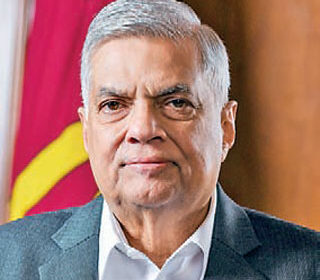 President Wickremesinghe’s appointment of a commission of inquiry to investigate existing election laws and regulations and recommend changes has come without prior discussion or warning. It was a carefully kept secret until brought to the notice of the general public by the president’s appointment of the commission. The commission has been tasked with examining all existing election laws and regulations and making recommendations to suit current needs. According to its terms of reference the factors to which special consideration would be given include increased women and youth representation, introduction of electronic voting using modern technology instead of printed ballot papers and providing facilities for voting by Sri Lankans overseas. These are commendable. But it also includes unusual provisions for Sri Lanka such as to enable a person to contest two elections at two different levels of government and represent both councils at the same time if elected. And the timing gives cause for concern.
President Wickremesinghe’s appointment of a commission of inquiry to investigate existing election laws and regulations and recommend changes has come without prior discussion or warning. It was a carefully kept secret until brought to the notice of the general public by the president’s appointment of the commission. The commission has been tasked with examining all existing election laws and regulations and making recommendations to suit current needs. According to its terms of reference the factors to which special consideration would be given include increased women and youth representation, introduction of electronic voting using modern technology instead of printed ballot papers and providing facilities for voting by Sri Lankans overseas. These are commendable. But it also includes unusual provisions for Sri Lanka such as to enable a person to contest two elections at two different levels of government and represent both councils at the same time if elected. And the timing gives cause for concern.
The changes proposed are major ones. With the commission given time till April to come up with its recommendations, it means elections are unlikely in the coming six month period. There would also be a time lag before which the changes can be given legal effect. The Commission’s recommendations would have to go before the cabinet of ministers. Upon their approval, it would have to be presented to parliament for its passage. There again, the contents are subject to challenge over their constitutionality before the supreme court ahead of the final passage of the recommendations. According to former Election Commissioner Mahinda Deshapriya, “It would be very difficult for the Commission to complete its task in just six months. There must be hours and hours, days and days of public discussion. This takes time. It could go on for even a year.” https://www.sundaytimes.lk/231022/columns/president-appoints-special-commission-to-drastically-change-election-laws-536547.html
The president’s sudden appointment of the Commission of Inquiry to investigate existing election laws and regulations and recommend changes becomes perplexing in the light on another surprise announcement by Minister of Justice Dr Wijayadasa Rajapaksha earlier last week that he had prepared a draft law on electoral reform that was all set to go. These reforms would see the election of 160 members to Parliament under the first-past-the-post system. The remaining 65 members in a 225-seat Parliament would be appointed from the National list and the District list depending on the number of voters under the proportional voting system.” Minister Wijayadasa’s proposals may fall within the remit of the newly appointed presidential commission. These two near simultaneous announcements would be recipes for confusion in the minds of the general public. When the time for elections falls constitutionally due, the electoral reforms and required electoral delimitation process could still be in process and constitute a volatile mix for political confrontation.
IMF SUPPORT
The speedy release of the IMF funds last week would be welcome news to the government as the need for both the money and the credibility that accompanies the IMF-led recovery process is of critical importance in an election period. It would help to impress the general population that the government continues to be in a position to access international resources on a large scale and better than its competitors in the political arena. It is indicative that the government has powerful backing within the international system of which the IMF is a part for which credit would accrue to the president. So far it seems that the government’s only concrete response to the IMF strictures and delay in granting the second tranche was to increase the price of electricity to add to its revenues in deference to the IMF requirement that the budget deficit should be made smaller. Government ministers have said this will enhance confidence in the economy and help to speed up the debt restructuring process with international creditors.
The IMF’s release of the second tranche of its loan to Sri Lanka came sooner than expected. It had informed the government that its revenue collection was inadequate to get the second installment of the IMF loan. The problem on the governance side seemed even more formidable. The IMF had recommended sixteen priority actions in its recently released Governance Diagnostic Assessment (GDA) on Sri Lanka to address systematic and severe governance weaknesses and deep-rooted corruption. The government’s performance has been less than impressive with regard to these prerequisites for development. The government’s track record of conforming to democratic norms and to the rule of law are not reassuring after it postponed the local government elections despite the Election Commission’s best efforts to hold them and failed to heed even a supreme court ruling that the money withheld from the Election Commission for the purposes of holding the elections should be released.
It is significant that the IMF release of the second tranche came shortly after the announcement by the Chinese government that it had reached preliminary agreement with Sri Lanka regarding debt relief that would be acceptable to other international creditors. It was also interesting that IMF personnel felt obliged to state that the agreement reached between the government and the Exim Bank of China did not have an impact on the IMF decision to reverse its original decision taken a little over a fortnight ago which was not to give Sri Lanka the second tranche for the time being. This would add to the stature of President Ranil Wickremesinghe as a worldly wise leader when it comes to negotiating with international power blocs. But within the country the challenge remains to win the trust of the general population. This requires winning the mandate of the people through free and fair elections in place of beefing up the security forces and security laws to suppress them.
POSTPONED ELECTIONS
Swift on the heels of receiving the IMF second tranche, President Wickremesinghe has moved to address the concern in sections of the population that the government is planning to stay on in power without conducting elections for the foreseeable future. This line of reasoning is being sincerely urged on society by some business leaders and economic planners, quite apart from political allies, as being necessary to consolidate the economic improvements they see as taking place. Although not the full story, the grim reality for the majority of people is that their living standards are deteriorating as evidenced by World Bank figures regarding the rise in poverty levels to 25 percent this year and 28 percent next year and World Health Organisation figures which show the rise in malnutrition. Public opinion polls which show the government getting less than 20 percent of the popular support consistently show the writing on the wall.
Different statements made over the last few weeks have given rise to the speculation that the government intends to postpone the forthcoming presidential and general elections or possibly not have them at all. Speaking from the heart as if it were UNP Chairman and Member of Parliament Wajira Abeywardana recently said that no one should contest the next presidential election for the sake of the nation. “The incumbent President can continue in office in such a scenario and see that the country moves forward. Also anyone who is contesting can submit an economic programme to the budget office which is instituted in the parliamentary complex. Budget office can go through the proposals and then state whether any proposal is realistic or not. No candidate can present to people any programme at any election when such a programme is rejected by the budget office. Besides it is also clear that there is no alternative in a situation where it is officially declared that Sri Lanka is bankrupt. In such a situation one could wonder whether it is wise to spend funds for a presidential election.” https://www.dailymirror.lk/print/front-page/No-one-should-contest-the-Presidential-election-for-the-sake-of-the-nation/238-269481
Addressing the UNP’s national convention as its party leader President Wickremesinghe sounded confident over his hold on power in the government when he reiterated the timeline for upcoming elections in line with the constitutional provisions. He said that the presidential election is scheduled for the following year, followed by parliamentary elections. However, his declaration that the local government elections are expected to take place only in the first half of 2025 needs to be reconsidered as those elections should have been held in March and not two years into the future. In addition, there are other statements regarding the abolition of the presidency, referendums and electoral reform that could singly, severally and jointly have the impact of negating elections. Arbitrary decisions with regard to elections should not be taken as those in power need to realise their power is temporary and they do not have a right to deny the people their right to vote and participate in the governance of the country for whatever reason.
https://island.lk/elections-dates-and-election-reforms/
China renews support for Sri Lanka
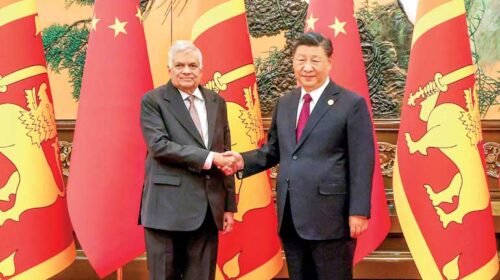
- President Wickremesinghe finally meets Chinese counterpart Xi Jinping in Beijing
- Xi assures China will continue to provide assistance to Sri Lanka without any political strings attached
- Says China and Sri Lanka should strengthen collaboration on international and regional affairs, oppose politicisation of the human rights issue and bloc confrontation, and safeguard the common interests of developing countries
- Expresses China’s willingness to import more quality and specialty products from Sri Lanka and encourage Chinese enterprises to invest and do business in Sri Lanka
- Says China glad to see Sri Lanka becoming a commercial centre in the Indian Ocean
- China stands ready to work with Sri Lanka to jointly promote high-quality Belt and Road cooperation and push for new progress
- Commends Wickremesinghe’s speech at UN General Assembly for reflecting strategic independence, neutral stance; Sri Lanka’s support for “Belt and Road” initiative
- Assures friendly, practical and timely support for Sri Lanka’s debt optimisation program
- SL expresses appreciation for China’s longstanding support
- Wickremesinghe shares vision to set up maritime economic corridor linking China, Myanmar, Sri Lanka and South Africa; Xi points to challenges; encourages Sri Lanka to take the lead
In a significant diplomatic encounter, President Xi Jinping yesterday extended China’s unwavering commitment to aiding Sri Lanka in achieving economic stability and progress, devoid of any political agenda.
This gesture was made during a meeting at the Great Hall of the People Beijing with President Ranil Wickremesinghe who was on a four-day official visit to China attending the third Belt and Road Forum for International Cooperation. It was also the first Presidential-level meeting since Wickremesinghe assumed office 14 months ago. China is the largest lender for Sri Lanka apart from being the biggest investor and the second biggest source for imports.
“China will continue to provide assistance to Sri Lanka without any political strings attached and help the country cope with difficulties concerning its society and people’s livelihood,” Xi was quoted as saying by Xinhua.
Xi also said China and Sri Lanka should “strengthen collaboration on international and regional affairs, oppose politicisation of the human rights issue and block confrontation, and safeguard the common interests of the two countries and developing countries,” Xi said.
Xinhua also said Xi had expressed China’s willingness “to import more quality and specialty products from Sri Lanka’, and encourage “Chinese enterprises to invest and do business in the country”, so as to help Sri Lanka transform and upgrade its economy and achieve sustainable development. Xi added that “China is glad to see Sri Lanka becoming a commercial centre in the Indian Ocean.”
Xi acknowledged that Sri Lanka was one of the first countries to join the Belt and Road Initiative and China stands ready to work with Sri Lanka “to jointly promote high-quality Belt and Road cooperation and push for new progress” in developing China-Sri Lanka strategic cooperative partnership featuring sincere mutual assistance and lasting friendship. Senior Chinese officials Cai Qi and Wang Yi attended the meeting.
The President Media Division (PMD) in its communique said the Chinese President acknowledged that Sri Lanka’s speech at the United Nations General Assembly, delivered by President Wickremesinghe, reflected the country’s strategic independence and its neutral stance.
During the discussions, President Xi reaffirmed China’s adherence to the “One China” policy and conveyed gratitude for Sri Lanka’s support for the “Belt and Road” initiative. He underscored the port city and Hambantota port as pivotal projects within this framework, pledging to boost imports of Sri Lankan goods to China and amplify investments in Sri Lanka.
Furthermore, he affirmed China’s intent to provide supportive, practical, and timely assistance for Sri Lanka’s debt optimisation program.
Touching on the historical ties between China and Sri Lanka, President Jinping referenced travel accounts by the Faxian monk and Zheng He, the PMD communique said.
It said in response, President Wickremesinghe expressed his appreciation for China’s longstanding support to Sri Lanka and commended President Xi Jinping for his consistently friendly attitude towards Sri Lanka.
Wickremesinghe also unveiled Sri Lanka’s vision to establish a maritime economic corridor linking China, Myanmar, Sri Lanka, and South Africa. Acknowledging the challenges inherent in such a venture, President Jinping encouraged Sri Lanka to take the lead.
The conversation underscored the pivotal role of Sri Lanka as an economic hub in the Indian Ocean region, with President Wickremesinghe reaffirming the country’s commitment to preserving peace and the identity of the region.
He advocated for collaborative efforts between India and China to propel development in Asia.
PMD said President Wickremesinghe further revealed Sri Lanka’s aspiration to attain developed status by 2048, citing the robust foundation laid by the eight-step program unveiled at the third “Belt and Road” forum for International Cooperation.
He informed the Chinese President about plans to construct a Sri Lankan Buddhist temple and stupa in commemoration of the visit of Faxian monk to Sri Lanka and President Xi Jinping expressed China’s support for these activities.
Additionally, the leaders delved into discussions concerning the ongoing conflict in the Gaza Strip.
Notable figures present at the event included Foreign Affairs Minister Ali Sabry PC, President’s Senior Adviser on National Security and Chief of Staff Sagala Ratnayaka, Central Bank Governor Dr. Nandalal Weerasinghe and President’s Private Secretary Sandra Perera.
https://www.ft.lk/top-story/China-renews-support-for-Sri-Lanka/26-754334
Abolition of time-tested Exchange Control Act Only 18 opposed it and 113 skipped vote
By Shamindra Ferdinando
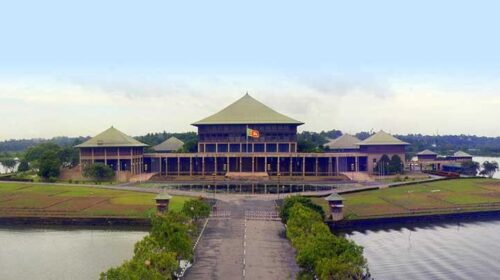 Amidst allegations that the abolition of the time-tested Exchange Control Act of 1953 contributed to the country’s bankruptcy and foreign exchange crisis, The Island, in terms of the Right to Information Act No 12 of 2016 requested from the Office of Secretary General of Parliament, the names of the MPs who had voted for the new law (Foreign Exchange Act No 12 of 2017) and those who opposed it.
Amidst allegations that the abolition of the time-tested Exchange Control Act of 1953 contributed to the country’s bankruptcy and foreign exchange crisis, The Island, in terms of the Right to Information Act No 12 of 2016 requested from the Office of Secretary General of Parliament, the names of the MPs who had voted for the new law (Foreign Exchange Act No 12 of 2017) and those who opposed it.
According to parliamentary records, 94 voted for the Bill and 18 voted against it while 113 skipped the vote. The TNA voted with the UNP and the SLFP-led UPFA for the new law. The then Prime Minister Ranil Wickremesinghe, who moved the second reading motion in his capacity as the Minister of National Policies and Economic Affairs was among those who skipped the vote on July 25, 2017.
Justice Minister Wijeyedasa Rajapakse voted for the new law, which, he says, has helped unscrupulous exporters park export proceedings overseas to the tune of USD 100 bn. Two of the strongest critics of current economic policies namely Dr. Harsha de Silva and Eran Wickremaratne voted for the new law enacted in 2017.
Former Governor of the Central Bank Dr. Indrajith Coomaraswamy has publicly alleged that the new exchange law was not formulated in consultation with the Central Bank. The Governor led Central Bank team which appeared before the Parliamentary Select Committee (PSC) probing the 2019 Easter Sunday carnage declared that the new law hindered its regulatory powers.
The following MPs voted for the new law: S.B. Dissanayake, Nimal Siripala de Silva, Gamini Jayawickrama, John Amaratunga, Lakshman Kiriella, Gayantha Karunatilleka, Rajitha Senaratne, Ravi Karunanayake, Kabeer Hashim, Sajith Premadasa, Mano Ganesan, Thilanga Sumathipala, Anura Priyadarshana. Yapa, Tilak Marapana, Vajira Abeywardena, S.B. Nawinna, Sarath Fonseka, Navin Dissanayake, Wijeyadasa Rajapakse,(Mrs.) Chandrani Bandara, (Mrs.) Thalatha Atukorale, D. M. Swaminadan, Abdul Haleem, Sagala Ratnayake, Daya Gamage, Faizer Musthapha, A. H. M. Fowzie, Dilan Perera, Lakshman Seneviratne, Ravindra Samaraweera, Niroshan Perera, Ruwan Wijewardene, Mohan Lal Grero, A.D. Premadasa Champika, Sujeewa Senasinghe, Wasantha Senanayake, Wasantha Aluvihare, Dr. Mrs. Sudarshini Fernandopulle, Eran Wickramaratne, Mrs. Sumedha G. Jayasena, Ameer Ali Shihabdeen, Lasantha Alagiyawanna, Faizal Cassim, Dr. Harsha De Silva, Ashok Abeysinghe, Karunarathna Paranawithana, Manusha Nanayakkara, Lucky Jayawardana, Vadivel Suresh, Edward Gunasekara M.S. Thowfeek, J.M. Ananda Kumarasiri, J.C. Alawathuwala, Seyed Ali Zahir Moulana, Ranjith Aluvihare, Abdullah Mahrooff, Srinal de Mel, Anura Sidney Jayarathne, K.K. Piyadasa, A.A. Wijetunge, Ajith Mannapperuma, Nalin Bandara Jayamaha, Hector Appuhamy, Sisira Kumara Abeysekara, Thushara Indunil Amarasena, A.Aravindh Kumar, Ananda Aluthgamage, K. Thurairetnasingam, Mavai S.Senathirajah, A. Adaikkalanathan, Sivagnanam Shritharan, E. Sarawanapawan, M.A. Sumanthiran, Charles Nirmalanathan, Gnanamuthu Srineshan, Ashoka Priyantha, Chandima Gamage, Mylvaganam Thilakarajah, Mohamed Navavi, Sujith Sanjaya Perera, Bandulal Bandarigoda, Imaran Maharoof, Ashu Marasinghe, Ishak Rahuman, Malith Jayathilake, Mujibur Rahuman, Harshana Rajakaruna, Jayampathy Wickramaratne, Thusita Wijemanne, Mrs. Rohini Kumari Wijeratne, Hesha Withanage, Sandith Samarasinghe, Chathura Senaratne and Wijepala Hettiarachchi.
The following MPs voted against D. V. Chanaka, Piyal Nishanta de Silva, Prasanna Ranaweera, Kanchana Wijesekara, Indika Anurudda Herath, Mrs. Sriyani Wijewickrama, Thenuka Vidanagamage, Shehan Semasinghe, Vijitha Herath, Bandula Gunawardane, C. B. Ratnayake, Nihal Galappathi, Gamini Lokuge, Rohitha Abeygunawardana, Wimalaweera Dissanayake, Udaya Shantha Gunasekara, Ranjith de Soysa and Roshan Ranasinghe. The then Speaker Karu Jayasuriya was in chair at the time the vote was taken.
Before the vote was taken the then UPFA MP Vasudeva Nanayakkara said the new law would lead to disaster. Quoting Washington-based Global Financial Integrity, MP Nanayakkara said that USD 1.99 bn had been moved out of the country through illegal means annually.
https://island.lk/abolition-of-time-tested-exchange-control-act-in-terms-of-rti-act-house-releases-names-of-mps-who-voted-for-new-law/
July exports decline by 12% YoY to $ 1 b
- Cumulative earnings in first seven months down by 10.26% to $ 6.89 b
- Apparel and textiles, rubber and rubber-based products, coconut and coconut-based products drop due to sluggish demand
- Services exports in January-July up by 17.32% to $ 1.22 b
- Exports to major markets US and EU plunge
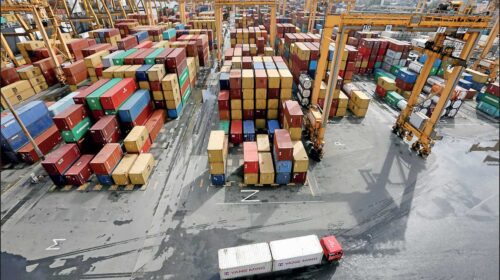 Sri Lanka’s export sector in July managed to sustain over $ 1 billion performance compared to June 2023, though on a year-on-year (YoY) basis, it fell by 12% due to sluggish demand in major markets.
Sri Lanka’s export sector in July managed to sustain over $ 1 billion performance compared to June 2023, though on a year-on-year (YoY) basis, it fell by 12% due to sluggish demand in major markets.
As per the provisional data released by the Export Development Board (EDB) yesterday, earnings from merchandise exports increased by 2.18% month-on-month to $ 1.02 billion in July 2023, but down by 11.79% YoY.
The EDB said the drop in merchandise exports is due to the lower demand shown in export products, especially in apparel and textiles, rubber and rubber-based products and coconut and coconut-based products.
From January to July 2023, cumulative merchandise exports saw a substantial decline of 10.26% to $ 6.89 billion compared to the corresponding period of 2022.
The estimated value of services exports for the period of January to July 2023 was $ 1.22 billion, registering an increase of 17.32% over the corresponding period of 2022. The services export estimated by EDB consists of ICT/BPM, construction, financial services and transport and logistics.
The EDB has set a forecast performance of $ 18.51 billion in merchandise and service exports in 2023. This comprises $ 15.93 billion from merchandise exports up from $ 13.01 billion achieved in 2022 and $ 2.58 billion from services exports.
Major Exports in July 2023
Export earnings of coconut kernel products and coconut fibre products increased by 3.95% and 0.92%respectively in July 2023 compared to July 2022.
export earnings from coconut milk powder, coconut cream and liquid coconut milk which are categorised under the coconut kernel products increased by 41.64 %, 23.05% and 10.16% respectively in July 2023 compared to July 2022.
Being the largest contributor to the coconut-based sector, coco peat, fibre pith and moulded products which are categorised under the coconut fibre products, increased by 1.99% to $ 15.35 million in July 2023 in comparison to July 2022.
In addition, export earnings from spices and essential oils increased by 10.68% to $ 37.53 million in the month of July 2023 compared to the month of July 2022 with a strong performance in the export of pepper (222.27%).
Export earnings from ornamental fish increased by 32.35% to $ 1.80 million in July 2023 compared to July 2022.
The value of ICT exports is estimated to increase by 45.5% to $ 132.25 million in July 2023 compared to July 2022. In addition, the value of transport and logistics services exports is estimated to increase by 26.45% in July 2023 compared with July 2022.
Export earnings from apparel and textiles have decreased by 22.28% YoY to $ 427.48 million in July 2023 compared to July 2022.
In addition, export earnings from tea which made up 12% of merchandise exports, decreased by 1.97% YoY to $ 115.2 million in July 2023 compared to July 2022. The earnings from the export of tea packets decreased by 1.93% YoY to $ 55.49 million.
Export earnings from rubber and rubber finished products have decreased by 11.13% YoY to $ 79.31 million in July 2023, with negative performance in exports of pneumatic and retreated rubber tyres and tubes (-5.76 %) and industrial and surgical gloves of rubber (-25.08%).
In addition, export earnings from the EEC decreased by 1.04%YoYto $ 40.82 million in July 2023 with poor performance in exports of electrical transformers (-32.13 %).
Export earnings from seafood decreased by 16.46% to $ 17.25 million in July 2023 compared to July 2022. This decrease was mainly due to the poor performance in the export of shrimps (-70.51%) and frozen fish (-4.27%).
On monthly analysis, export earnings of coconut-based products decreased by 5.67% in July 2023 compared to July 2022. Export earnings of coconut shell products decreased by 31.14% to $ 11.52 million in July 2023 compared to July 2022. Earnings from activated carbon, which is categorised under the coconut shell products decreased by 30.37% to $ 10.64 million in July 2023 compared to July 2022.
Major exports during January – July
Earnings from the export of tea, spices and concentrates, gems and jewellery and EEC increased by 8.03%, 11.57%, 19.06 %and 10.0% respectively during the period of January – July 2023 compared with the corresponding period of 2022.
Earnings from the export of tea increased by 8.03% to $ 750.72 million due to the increase of all the subcategories of the tea sector except bulk tea and tea bags. earnings from tea packets, instant tea, green tea and other tea increased by 13.5%,44.71 %, 57.65% and 48.41% in the period of January-July 2023.
In addition, export earnings from spices and essential oils increased YoY by 11.57% to $ 216.73 million in the period of January to July 2023. Export earnings from cloves increased YoY by 247.25% to $ 35.94 million in the period of January to July 2023.
Meanwhile, earnings from the export of EEC increased by 10.0% to $ 296.58 million in the period of January to July 2023 compared to the corresponding period of 2022.
earnings from export of printed circuits, switches/boards and panels, boilers/ piston engines/ pumps and vacuum pumps and other EEC increased by 49.86%, 13.28% and 827.71%respectively in the period of January to July 2023 compared to the corresponding period of 2022.
The value of ICT exports is estimated to increase by 17.78% to $ 793.8 million in the first seven months of 2023 compared to the corresponding period of 2022. In addition, construction and financial services exports are estimated to increase by 130.21%and 37.77% respectively in the period of January to July 2023 compared with the corresponding period of 2022.
Earnings from export of apparel and textiles decreased by 18.10% to $ 2.88 billion during the period of January -July 2023 compared to the same period of 2022. The export of apparel declined by 18.98% and the export of textiles declined by 7.64% from January to July 2023.
in addition, export earnings from rubber and rubber finished products decreased by 12.67%to $ 529.08 million in January-July 2023 compared with the same period of 2022 attributed to lower exports of industrial and surgical gloves of rubber (-26.49%) and pneumatic and retreated rubber tyres and tubes (-6.02%).
For the period of January to July 2023, export earnings from coconut and coconut-based products decreased by 19.68% to $ 402.80 million from the same period last year. earnings from all the major categories of coconut-based products decreased in the period of January – July 2023 compared with the corresponding period of 2022 due to the poor performance in the export of coconut oil (-24.96 %), desiccated coconut (-35.75%), coconut milk powder (-12.37 %), coconut cream (-21.13 %), liquid coconut milk (-12.28%), cocopeat (-16.61%) and activated carbon (-16.81%).
further, export earnings from seafood decreased by 8.10%to $ 149.63 million during the period of January to July 2023 compared to the year 2022 due to the poor performance in frozen fish (-6.74 %), fresh fish (-5.93 %) and shrimps (-38.02%).
Export performance in major markets
Out of the top 10 export markets, only UAE has shown strong performance during the month of July 2023 and the period of January to July 2023 compared to the corresponding period in the previous year.
Further, India, UAE and France have shown strong performance during the month of July 2023 compared to July 2022.
Exports to the US – Sri Lanka’s single largest export destination, decreased 15.60% to $ 253.79 million in July 2023 compared to July 2022. Further, exports to the US decreased by 18.5% to $ 1.62 billion in the period of January to July 2023 compared to the same period in 2022.
Exports to FTA partners
Exports to Free Trade Agreement (FTA) partners accounted for 6.5% of total merchandise exports and have increased by 27.99% to $ 87.98 million in July 2023 compared to July 2022.
Exports to India increased by 29% while exports to Pakistan increased by 16.93% in July 2023 compared to July 2022.
Strong performance recorded in India led by increased exports of pepper (240.44 %) and areca nut (75.13%). Better performance recorded in Pakistan led by increased exports of sheet rubber and desiccated coconut.
During the period of January to July 2023 exports to FTA partners accounted for 7.2% of total merchandise exports decreased by 2.37% to $ 534.45 million compared with the corresponding period of the previous year.
Exports to India and Pakistan decreased by 1.37% and 13.01% respectively during the period of January to July 2023 when compared with the corresponding period of 2022.
Decreased exports to India led by poor export performance of animal feed (-2.24%), pepper (-12.53%), areca nut (-7.92%) and wood pulp (-47.79%) and decreased exports to Pakistan led by export of sheet rubber (-18.49%) and desiccated coconut (22.98%).
Sri Lanka’s export performance in regions
Exports to the European Union (EU) which comprised 21% of Sri Lanka’s exports during the month of July 2023 fell by 16.18% YoY to $ 230.47 million. Further, during the first seven months, exports to the European Union (EU) decreased by 12.79% YoY to $ 1.54 billion compared to the corresponding period of the previous year.
During the period of January to July 2023, the breakdown of exports to the top five EU markets which accounted for 78% of Sri Lanka’s total exports to the EU were; Germany $ 349.9 million (down by 22.33%), Italy $ 381.23 million (up by 6.13 %), Netherlands $ 197.11 million (down by 15.72%), Belgium $ 132.51 million (down by 28.89%) and France $ 152.25 million. (down by 1%).
https://www.ft.lk/top-story/July-exports-decline-by-12-YoY-to-1-b/26-752366
Ranil, Modi unveil new Indo-Lanka economic partnership vision
- Following historic meeting in New Delhi, announce series of measures to catalyse prosperity via promotion of greater cooperation and connectivity in areas of maritime, air, energy and power; trade, economic and financial services and people-to-people
- Agree to undertake discussions on Economic and Technology Cooperation Agreement with an aim to comprehensively enhance bilateral trade and investments in new and priority areas
- To undertake mutually agreed joint exploration and production of hydrocarbons in Sri Lanka’s offshore basins with an aim to develop Sri Lanka’s upstream petroleum sector
- Commit to a dynamic India-Sri Lanka relationship, founded on enhanced mutual confidence and trust
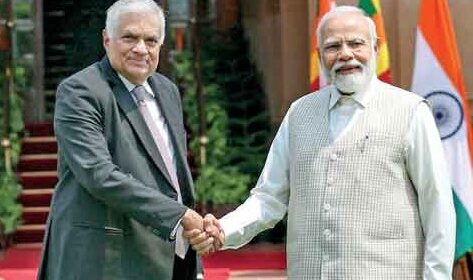 President Ranil Wickremesinghe and Prime Minister Narendra Modi yesterday unveiled a new Indo-Lanka economic partnership vision following their meeting in New Delhi.
President Ranil Wickremesinghe and Prime Minister Narendra Modi yesterday unveiled a new Indo-Lanka economic partnership vision following their meeting in New Delhi.
During the visit by Wickremesinghe to India, first as the President of Sri Lanka, had productive and outcome-oriented discussions.
“The leaders acknowledged that the India-Sri Lanka partnership has been a source of strength in overcoming economic difficulties faced by Sri Lanka and the President of Sri Lanka especially appreciated India’s timely, unprecedented, and crucial support to the Government and the people of Sri Lanka,” a statement issued by the Indian High Commission said.
Both leaders reiterated their firm commitment to, and confidence in, democracy, stability and economic recovery in Sri Lanka, and stressed the significance of India’s continued support and investment for sustainable, equitable and stable growth which will benefit all segments of Sri Lankan society in all parts of the country, and also promote reconciliation.
The two leaders agreed that India’s sustained and rapid economic growth, and technological advancement coupled with the current phase of stabilisation and economic recovery, reconstruction and growth in Sri Lanka, provides a unique opportunity to forge a closer and deeper bilateral economic partnership between the two countries and enhance growth in the Indian Ocean Region.
Further, the leaders underscored the unparalleled advantages afforded by civilizational ties, geographical proximity, cultural connect and age-old goodwill between the peoples of the two countries and reaffirmed their endeavour to harness existing synergies and complementarities in a manner that brings shared and sustainable economic prosperity.
To this end, the leaders underlined the cardinal importance of promoting and strengthening connectivity in all its dimensions as the key enabler. Accordingly, both leaders have decided:
Maritime connectivity:
a. To cooperate in development of ports and logistics infrastructure at Colombo, Trincomalee and Kankesanthurai with an aim to consolidate regional logistics and shipping, as per mutual understanding;
b. To resume passenger ferry services between Nagapattinam in India and Kankesanthurai in Sri Lanka and work towards early resumption of ferry services between Rameshwaram and Talaimannar, and other mutually agreed places.
Air connectivity:
a. That resumption of flights between Jaffna and Chennai have enhanced people-to-people ties and agreed to further expand it to Colombo as well as explore connectivity between Chennai and Trincomalee, Batticaloa and other destinations in Sri Lanka;
b. To encourage and strengthen investment and cooperation in civil aviation, including augmentation of airport infrastructure at Palaly for greater economic benefits to the people.
Energy and Power connectivity:
a. That conclusion of MoU on cooperation in developing renewable energy would develop Sri Lanka’s significant renewable energy potential, including offshore wind and solar, thus enabling Sri Lanka achieve its target of generating 70% of power requirements from renewable energy sources by 2030;
b. To establish a high capacity power grid interconnection between India and Sri Lanka to enable bidirectional electricity trade between Sri Lanka and other regional countries, including the BBIN countries, which has the potential to not only bring down the costs of electricity in Sri Lanka but also help create a valuable and dependable source of foreign exchange for Sri Lanka;
c. To expedite implementation of understanding reached on Sampur Solar power project and LNG infrastructure, and explore cooperation in green hydrogen and green ammonia through use of innovative technologies with an aim to increase renewable energy mix in power generation of Sri Lanka.
d. That ongoing cooperation in development of Trincomalee Tank Farms is a reflection of our endeavour to develop mutually beneficial cooperation projects in Trincomalee area, and agreed to further develop Trincomalee as a national and regional hub of industry, energy and economic activity on the basis of mutual understanding;
e. To cooperate for construction of a multi-product petroleum pipeline from Southern part of India to Sri Lanka with an aim to ensure affordable and reliable supply of energy resources to Sri Lanka;
f. To undertake mutually agreed joint exploration and production of hydrocarbons in Sri Lanka’s offshore basins with an aim to develop Sri Lanka’s upstream petroleum sector.
Trade, Economic and Financial Connectivity:
a. That salience of bilateral trade and economic engagements was significantly demonstrated during COVID pandemic and economic crisis of Sri Lanka, and agreed to facilitate mutual investments through, inter alia, policy consistency, promoting ease of doing business and fair treatment of each other’s investors;
b. To facilitate investments from India in the divestment of Sri Lankan State-owned Enterprises and in manufacturing/economic zones in various sectors in Sri Lanka;
c. To undertake discussions on Economic and Technology Cooperation Agreement with an aim to comprehensively enhance bilateral trade and investments in new and priority areas;
d. That decision to designate INR as currency for trade settlements between the two countries has forged stronger and mutually-beneficial commercial linkages, and agreed to operationalise UPI based digital payments for further enhancing trade and transactions between businesses and common people;
e. That India’s rapid digitalisation is an important force-multiplier for ongoing transformational changes in India, both in economic development and governance, and agreed to leverage India’s Digital Public Infrastructure in accordance with Sri Lanka’s requirements and priorities towards effective and efficient delivery of citizen-centric services to the people of Sri Lanka.
People-to-people Connectivity:
a. To promote awareness and popularise India’s Buddhist circuit, and Ramayana trail as well as ancient places of Buddhist, Hindu and other religious worship in Sri Lanka for enhancing tourism;
b. To explore cooperation between educational institutions on both sides including through establishment of new higher education and skilling campuses in Sri Lanka in accordance with Sri Lanka’s requirements and priorities;
c. To expand cooperation between research and academic institutes in areas of mutual interests such as agriculture, aquaculture, IT, business, finance and management, health and medicine, earth and marine sciences, oceanography, space applications, as well as history, culture, languages, literature, religious studies and other humanities; and
d. To establish land connectivity between Sri Lanka and India for developing land access to the ports of Trincomalee and Colombo, propelling economic growth and prosperity in both Sri Lanka and India, and further consolidating millennia old relationship between the two countries. A feasibility study for such connectivity will be conducted at an early date.
Both the leaders directed respective officials concerned to expedite realisation of this shared vision, which will not only impart long-term direction and significant momentum to bilateral cooperation for growth and prosperity in both countries and in the wider region, but also set the future direction of a dynamic India-Sri Lanka relationship, founded on enhanced mutual confidence and trust.